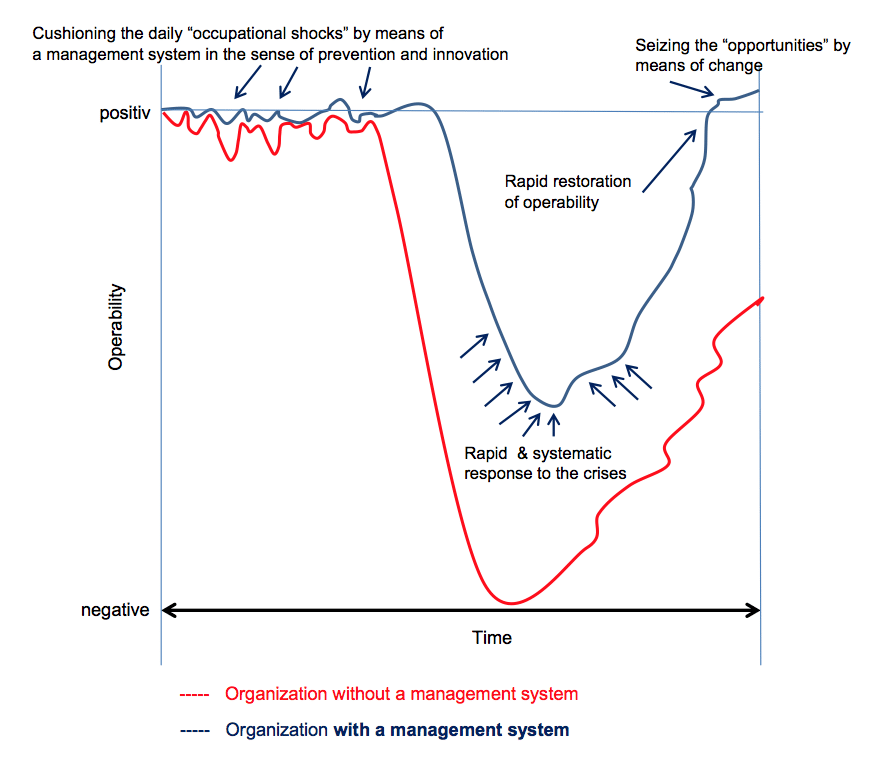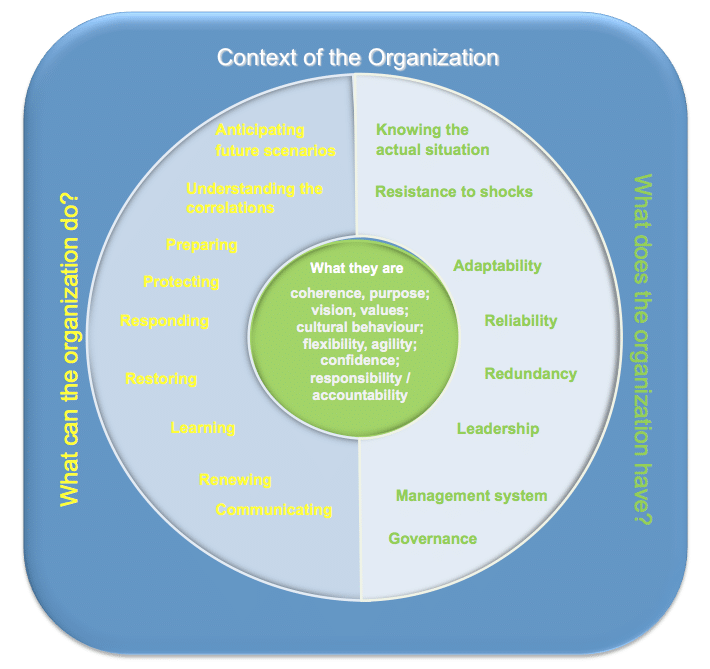Organizational Resilience
This article deals with the term of “resilience” in the context of economic systems, e.g. profit oriented companies and organizations. The term of “resilience” is a term that is well established and describes the way an individual, a company, a society as well as a system (e.g. eco-system) succeeds in persisting successfully in spite of such adverse impacts as failures and malfunctions, damaging events or changes.
Based on worldwide studies made to determine the cause of business success or corporate damage after the economic crisis in 2008, it became quite obvious that resilience is a central element for business success after crises.
In slightly more simplified terms, resilience means the following: “Not keeping lying on the floor after crises, flops and throwbacks but vigorously positively designing one’s own future - just like a tumbler”.
It is about more than withstanding a failure or damage. On the contrary: It is a matter of persisting positively and successfully in spite of major negative incidents.
“Organizational resilience” is an organization’s capability of systematically pre-determining changes (e.g. risk portfolio with a likelihood of occurrence) and responding and adapting to these changes. In the best case, this is to help to avoid damage even before it occurs and to seize the resulting opportunities.
The preventive systematic management system approach is particularly important in several respects: On the one hand, it is supposed to prepare an organization for potential upcoming incidents. On the other hand, it is, in case of occurrence, supposed to enable the organization not only to avert the negative happening but even to transform it into a positive event. The organization does not rely on luck or coincidence but takes the reins itself. The organization has a realistic picture of its capabilities (SWOT - strengths, weaknesses, opportunities and threats) and thus sufficient self-confidence, with which it appears on the market. Based on this self-image, the organization will systematically identify the opportunities and will seize them as soon as they are offered.


Graphics © Eckehard Bauer, MSc
Enhancing the organization’s resilience potential
A classical approach is the systematic approach of continual improvement and corrective and preventive action. These tools are standard tools of most management system standards (e.g. ISO 9001 or ISO 14001). The basic understanding of a management system standard is “prevention”. For this purpose, it is necessary to know the organization’s purpose and have an adequate strategy and the corporate goals derived from this. Management systems form a stabilizing factor, which will be decisive for maintaining an organization’s operability, above all in emergency and crisis situations.
Anything that can have adverse impacts on the corporate goals is to be identified systematically. This is ensured by the risk based approach, which is given ample room in the revision of ISO 9001. However, identifying and avoiding the threats is not the exclusive goal. It also is a matter of “systematically” identifying and seizing the opportunities. If negative incidents (crises) occur, maintenance of the organization’s operability does not only necessitate classical crisis management but also, above all, “Business Continuity Management”, which will help to limit damage that has occurred and re-enter the productive phase soon enough.
Thanks to systematics that can be based on management systems, the “factor time” is decisive to be productive again.
It is in this respect that the strength of the “resilient organizations” is shown. Thanks to the systematic approach, these organizations succeed in identifying and seizing the opportunities in a timely manner as early as in the phase of elimination of damage. Other organizations, for their part, will, in a similar situation, exclusively focus on damage and thus allow “restoration” to cause precious time to elapse.
In this respect, such management systems as ISO 9001 (quality management), ISO 3100 and ONR 49000ff (risk management) or ISO 22301 (business continuity management) offer practice oriented and proven approaches for sustainably strengthening an organization and thus continually maintaining operability and systematically seizing the opportunities for the future.